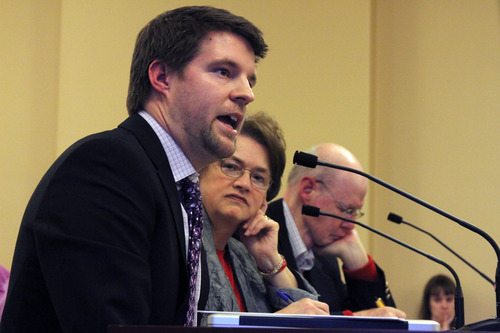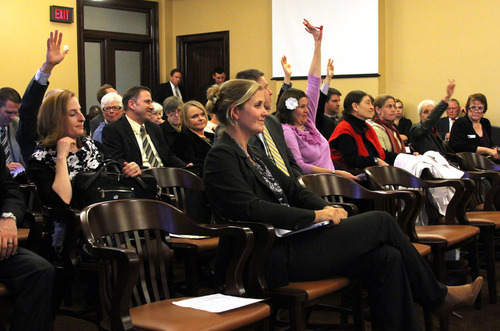This is an archived article that was published on sltrib.com in 2012, and information in the article may be outdated. It is provided only for personal research purposes and may not be reprinted.
Lawmakers are moving ahead with a plan to revamp the boards that regulate air, water, hazardous waste and radioactive material in the state, despite objections from advocates who said they were tipping the scales even more in industry's favor.
"I don't see anything that is wrong with the process now other than it is already too weighted toward the industry," said advocate Claire Geddes. "It's about time in this state that we start worrying about the public — instead of just the industry — and our air and our health and our water."
SB21, sponsored by Sen. Margaret Dayton, R-Orem, would shrink the size of the policy-making and appeals boards to nine members and shift their responsibilities to hear appeals to administrative law judges.
The measure passed the House Natural Resources, Agriculture, and Environment Committee on a 9-1 vote, with Rep. Joel Briscoe, D-Salt Lake City, casting the only opposing vote.
Dayton said that the membership on the boards have been put together in a "patchwork fashion" and have become "large and ungainly," especially when compared to similar boards in other departments.
James Holtkamp, air quality chairman for the Utah Manufacturers Association, said it is difficult, with large groups with disparate interests, to come to agreement on issues. Shrinking the size and narrowing their focus, he said, "enhances the board's important role to receive public input."
Holtkamp said the boards lack the expertise to handle complicated appeals. Twice in recent years appeals to the board have gone all the way to the Utah Supreme Court, only to be overturned and returned to the board — once was for the Intermountain Power Project Unit 3 in Delta, and the other the Sevier Power Project.
Both projects were eventually scrapped, he said, because they were unable to get the permits in a timely manner.
The bill was crafted by the Utah Manufacturers Association and the Utah Mining Association. The Manufacturers Association has given $86,000 to legislative campaigns over the last four years.
Holtkamp said six environmental groups were invited to participate in crafting the bill, but only one did - although environmental advocates disputed that they were asked to take part.
Christopher Thomas from the Healthy Environment Alliance of Utah did take part in the workshop on the bill, but said that as it is proposed it puts too much power in the hands of the executive director of the Department of Environmental Quality, who sits on each board.
"The argument could be made that these permit issuances would be political decisions, basically made by the governor," he said. "Especially on controversial decisions, the process benefits by bringing in other stakeholders."
Cherise Udell, president of the group Utah Moms for Clean Air, said the Department of Environmental Quality is supposed to protect the public health, not industry's profits.
"I ask all of you to not vote with your friends," she said, "[but] vote with the public you took an oath to protect."
Rep. Mike Noel, R-Kanab, took umbrage at the suggestion that lawmakers were watching out for industry.
"When people get up here and they question our integrity, that somehow we're voting for these laws and regulations we pass because of some kind of association or friendship, it's reprehensible is what it is," he said.
He went on to praise the work of the Utah manufacturing industry for persevering in the face of stiff competition overseas, an economy in "shambles," and stringent environmental regulations.
Twitter: @RobertGehrke





